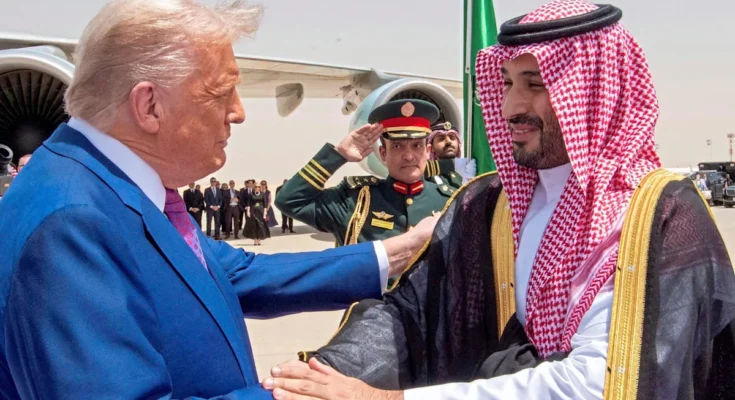Despite urgent warnings from the Netanyahu government, the US President wants to send F-35 fighter jets to Saudi Arabia. By doing this, Trump violated decades-old US Middle East doctrine. There is more at stake for Israel during the Saudi crown prince’s upcoming visit to Washington.
Shortly before Saudi Arabia’s Crown Prince Mohammed Bin Salman’s visit to US President Donald Trump, nervousness in Jerusalem was palpable. If Trump sends F-35 fighter jets to Saudi, it would be a “dangerous step,” an Israeli Defense Ministry representative warned Haaretz newspaper on the eve of his visit.
Just hours after the warning report was released, news emerged that Trump was still giving the Saudis what they wanted. “I would say we will do this,” Trump said Monday. “We will sell F-35s.” And then he praised the kingdom for its long-standing partnership with the United States.
The F-35 is perhaps the most powerful fighter aircraft in the world, equipped with stealth technology and widely networked with virtual force systems. Outside of NATO, very few countries have received these weapons; Turkish President Recep Tayyip Erdogan has been asking for it for years and in vain, and in the Middle East only Israel has such a plane.
That’s why Donald Trump’s deal is also a violation of a decades-old principle of US security policy – namely never questioning Israel’s strategic advantage when supplying weapons to other partners in the Middle East. After all, these advantages are part of Israel’s security doctrine. But Israel could lose more than just air sovereignty in the Middle East if Trump meets Mohammed bin Salman.
Strategic problem for Israel
According to information from the “Financial Times”, the summit will likely focus on economic issues and cooperation in artificial intelligence as well as defense alliances. This includes, among other things, F-35 jets, as well as basic American security guarantees to the Saudis – allegedly more comprehensive than the assurances Trump recently gave to Qatar.
After Israel attempted to assassinate a Hamas commander in Qatar’s capital, Doha, with an airstrike in September, the US President gave broad assurances to the mediating country. The US will defend Qatar, where the largest US base in the region is located, from any future attack, using all “lawful and appropriate measures – including diplomatic, economic and, if necessary, military,” Trump said in a decree.
Qatar’s aid obligations formulated in this way are very similar to NATO’s obligations. But the Saudis are said to be conducting further negotiations, according to the Financial Times. From Israel’s perspective, there is a strategic problem: Peace between Israel and Saudi Arabia – a key goal of Israeli foreign policy in recent decades – could become increasingly remote as a result.
This is paradoxical: in fact, politicians, strategists and intellectuals have repeatedly imagined the image of NATO in the Middle East in recent years. The main reason: the shared security interests of Israel, America and the Arab Gulf states in their long-running conflict with Iran. A fundamental condition for the alliance is the recognition of Israel by Western-oriented Arab states, especially by Saudi Arabia, which plays a leading role in the Muslim world as the most powerful country in the region and home to the holy sites of Mecca and Medina.
The Abraham Accords recognizing Israel, which the Jewish state has agreed in recent years with the United Arab Emirates, Bahrain and Morocco, are also seen as a precursor to a major and comprehensive peace with Saudi. In fact, former US President Joe Biden and Trump before him tried to broker Israeli-Saudi peace during his first term. But at the heart of negotiations there are always two constants – incentives and issues.
The problem, on the one hand, is the Saudi demand that Israel implement a two-state solution with the Palestinians – and, on the other hand, Israeli Prime Minister Benjamin Netanyahu’s refusal to make such a promise. This problem still exists, and after the devastation caused by the Gaza war, the Saudis can no longer afford to give up on this issue. This would turn their own population and much of the Muslim world against the kingdom.
And Netanyahu has just ruled out another two-state solution under pressure from his right-wing coalition partners from the Jewish settler movement. Prior to the Crown Prince’s visit, Saudi journalist Ali Shehabi, who has close ties to the royal family, warned in the New York Times that peace in Israel would definitely not be announced during the visit. However, the F-35 deal raises questions about whether Israeli-Saudi peace can still be hoped for in the future.
Trump’s policy in the Gulf region is not based on Jerusalem’s wishes
For the Saudis, the incentive for the Abraham Accords was always the kind of American rewards that Trump could provide – namely comprehensive security guarantees and cooperation in civil nuclear technology. This plane deal is not the whole package, but with this decision, Trump made it clear that his Gulf policy is not based on Israel’s desires. He may want to put pressure on Israel to get Netanyahu to implement Trump’s Gaza peace plan, which also includes steps toward a two-state solution. But if the Saudis get everything they want bit by bit, then they will have fewer reasons to sign a deal with Israel.
If you talk to people who have access to the Saudi judiciary and security advisers from other Gulf states, it seems that almost no one there hopes for a Saudi-Israeli agreement any more. There seems to be no hope of negotiating a compromise with Netanyahu and his coalition government – and the Trump administration has been very cooperative. However, America has its own interests in strengthening its security cooperation with Gulf Arab states – not only because of the danger of an Iranian nuclear bomb, but also because of its rivalry with China, which is aggressively seeking influence in the Middle East.
Trump himself is also very involved in the Gulf region. In both his first and second terms, the president’s first foreign trip was to Saudi Arabia. Trump is also active in the Gulf as a businessman. He just negotiated another real estate deal in the Saudi Arabian metropolis of Jeddah, this time worth a billion US dollars, according to Financial Times research.
The prospect of peace between the kingdom of Saudi Arabia and the Jewish state will not disappear easily. But given such relations, Saudi dependence on this peace is diminishing.
Daniel Dylan Bohmersenior editor in the foreign policy department, has traveled to Middle Eastern countries for decades. His main focus is on regional and global security issues and is regularly interviewed as an expert on Middle Eastern TV and radio stations.


